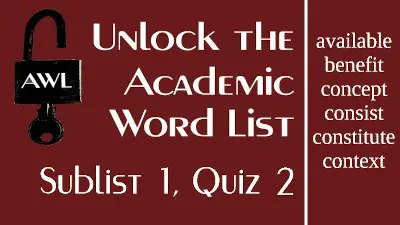AWL Sublist 1, Quiz #2 available, benefit, concept, consist, constitute, context
About the quiz

This is the second quiz in the Unlock the Academic Word List series. This quiz covers the second set of six words from sublist 1 of the Academic Word List, namely: available, benefit, concept, consist, constitute, context. If you haven't studied the words before, below is all the information you need, including part of speech, example sentences, and common collocations from the Academic Collocation List (ACL). Start studying them now!
Please log in to access quiz.
Learning Outcomes
By completing each quiz in the Unlock the Academic Wordlist series, sublist 1 (10 quizzes in total), you will:
- understand the meaning(s) of each sublist 1 word in academic use;
- learn to use vocabulary productively by focusing on word form, word family and example sentences for each word;
- use collocations from the Academic Collocations List (ACL) to develop knowledge of academic collocations for each word;
- learn patterns of affixes (prefixes and suffixes) for the words under study, e.g. to make noun or adjective forms.
available
[əveɪləbəl]
adj
1. obtainable or accessible and ready for use or service. E.g.: kept a fire extinguisher available, much information is available through computers, available in many colors, the list of available candidates is unusually long
n (thing)
availability
adj
available
opposite
unavailable
Collocations from the ACL
adj+n: available data, available evidence, available information, available resources.
adv+adj: currently available, freely available, publicly available, readily available, widely available.
v+adj: become available, make available.
benefit
[benəfɪt]
verb
1. derive a benefit from. [Syn: profit, gain]
2. be beneficial for. [Syn: do good]
noun
1. something that aids or promotes well-being. [Syn: welfare]
n (thing)
benefit
n (person)
beneficiary
verb
benefit
verb forms
benefited, benefiting, benefits
adj
beneficial
Collocations from the ACL
adj+n: beneficial effect, economic benefits, potential benefits.
concept
[kɑnsept]
noun
1. an abstract or general idea inferred or derived from specific instances. [Syn: conception, construct]
n (thing)
concept, conception, conceptualisation
verb
conceptualise
verb forms
conceptualised, conceptualises, conceptualising
adj
conceptual
adv
conceptually
Collocations from the ACL
adj+n: abstract concept, basic concept, central concept, defining concept, key concept, theoretical concept, conceptual framework.
consist
[kənsɪst]
verb
1. be composed of. E.g.: What does this dish consist of? [Syn: comprise]
n (thing)
consistency
verb
consist
verb forms
consisted, consisting, consists
adj
consistent
adv
consistently
opposite
inconsistency, inconsistent
Collocations from the ACL
adj+n: consistent pattern, consistent results.
constitute
[kɑnstətut]
verb
1. form or compose. E.g.: These constitute my entire belongings [Syn: represent, make up, comprise, be]
n (thing)
constituency, constituent, constitution
verb
constitute
verb forms
constituted, constitutes, constituting
adj
constitutional, constitutive
adv
constitutionally
opposite
unconstitutional
Collocations from the ACL
adj+n: constituent elements, constituent parts.
context
[kɑntekst]
noun
1. the set of facts or circumstances that surround a situation or event. E.g.: the historical context [Syn: circumstance]
2. discourse that surrounds a language unit and helps to determine its interpretation. [Syn: linguistic context, context of use]
n (thing)
context
verb
contextualise, contextualize
verb forms
contextualised, contextualises, contextualising, contextualized, contextualizes, contextualizing
adj
contextual
opposite
uncontextualised, uncontextualized
Collocations from the ACL
adj+n: broader context, cultural context, economic context, global context, historical context, institutional context, international context, original context, political context, present context, social context, specific context, wider context, contextual factors.
Definitions taken from WordNet 3.0 Copyright 2006 by Princeton University. All rights reserved.
THIS SOFTWARE AND DATABASE IS PROVIDED 'AS IS' AND PRINCETON UNIVERSITY MAKES NO REPRESENTATIONS OR WARRANTIES, EXPRESS OR
IMPLIED. BY WAY OF EXAMPLE, BUT NOT LIMITATION, PRINCETON UNIVERSITY MAKES NO REPRESENTATIONS OR WARRANTIES OF MERCHANT-
ABILITY OR FITNESS FOR ANY PARTICULAR PURPOSE OR THAT THE USE OF THE LICENSED SOFTWARE, DATABASE OR DOCUMENTATION WILL NOT
INFRINGE ANY THIRD PARTY PATENTS, COPYRIGHTS, TRADEMARKS OR OTHER RIGHTS.
Pronunciation of words is adapted from The Carnegie Mellon University Pronouncing Dictionary.
